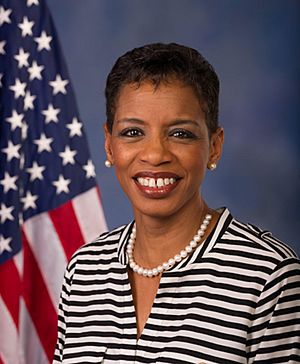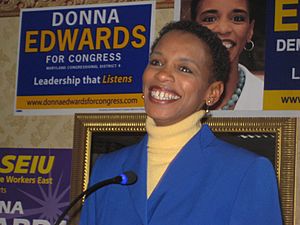Donna Edwards facts for kids
Quick facts for kids
Donna Edwards
|
|
|---|---|
 |
|
| Member of the U.S. House of Representatives from Maryland's 4th district |
|
| In office June 17, 2008 – January 3, 2017 |
|
| Preceded by | Albert Wynn |
| Succeeded by | Anthony Brown |
| Personal details | |
| Born |
Donna Fern Edwards
June 28, 1958 Yanceyville, North Carolina, U.S. |
| Political party | Democratic |
| Residences | Oxon Hill, Maryland, U.S. |
| Education | Wake Forest University (BA) University of New Hampshire (JD) |
Donna Fern Edwards (born June 28, 1958) is an American politician. She served as a U.S. representative for Maryland's 4th district from 2008 to 2017. This district included most of Prince George's County and part of Anne Arundel County. She is a member of the Democratic Party.
Before becoming a representative, Donna Edwards was a lawyer and a community activist. She won against the person who held the seat before her, Albert Wynn, in a special election on June 17, 2008. She became the first African-American woman to represent Maryland in the United States Congress. She won a full term in November 2008 with a large number of votes. In 2016, she ran for the U.S. Senate but did not win the primary election. In 2022, she ran for her old congressional seat again but was not successful.
In 2013, she supported a change to the U.S. Constitution. This change would have canceled a 2010 Supreme Court decision about money in elections.
Contents
Early Life and Education
Donna Edwards was born in Yanceyville, North Carolina. She studied English and Spanish at Wake Forest University. She was one of only six Black women in her graduating class of 1980.
After college, she worked for a company called Lockheed Corporation. She helped with the Spacelab program at the Goddard Space Flight Center. Later, she went to law school and earned her law degree in 1989. In the 1980s, she also worked for Albert Wynn when he was a member of the Maryland House of Delegates.
Standing Up for Others
Donna Edwards has always worked to help people. She helped start an organization called the National Network to End Domestic Violence. This group helps people who have experienced violence at home. She also worked to pass the 1994 Violence Against Women Act. This law helps protect women from violence.
She also worked with other groups like Public Citizen and the Center for a New Democracy. Later, she became the leader of the Arca Foundation.
In 2015, Donna Edwards helped introduce a bill called the Restoring Education and Learning Act (REAL Act). This bill aimed to bring back financial aid for prisoners to go to college. She believed that educating prisoners could help them when they leave prison. This could also save taxpayers money in the long run.
Edwards is also a leader for a group called Health Care Voter. This group works to make sure everyone has access to good healthcare.
Serving in the U.S. House of Representatives
A U.S. Representative is a person elected to speak for the people in their district in the United States House of Representatives. This is one part of the U.S. Congress.
Winning Elections
2006 Election
In 2006, Donna Edwards ran against the current representative, Al Wynn. This district usually votes for Democrats, so the primary election was very important. Edwards talked about Wynn's voting record. She pointed out that he voted for the 2002 Iraq War, which she was against. She also disagreed with some of his votes on taxes and bankruptcy laws.
The Washington Post newspaper supported Edwards in this election. In the end, Wynn won by a small number of votes.
2008 Special Election

In 2008, Edwards ran against Wynn again in the Democratic primary. She said that Wynn was not connected enough with the community. She also mentioned that he accepted money from large companies.
On February 12, 2008, Edwards won the primary election by a lot, getting 60% of the votes. This win meant she would likely win the main election later. After this, Wynn announced he would leave his job early in June 2008. Edwards then won a special election on June 17, 2008, to finish the rest of Wynn's term. She officially started her job two days later.
2008 Full Term Election
Edwards ran for a full term in November 2008. She was expected to win easily because her district usually votes for Democrats. She won with 85% of the votes. This was one of the highest percentages for a Democrat running against a major party opponent that year.
Later Elections
Donna Edwards continued to win her elections for the House of Representatives. She won in 2010, 2012, and 2014. In these elections, she consistently received a large majority of the votes.
2022 Election
In 2022, the person who held her old seat, Anthony Brown, decided not to run again. Donna Edwards announced that she would run for her old congressional seat. She faced Glenn Ivey in the Democratic primary election. She did not win this election, receiving 35% of the votes compared to Ivey's 52%.
Important Actions in Congress
Protesting for Darfur
On April 27, 2009, Representative Donna Edwards was part of a protest outside the Sudan embassy in Washington, D.C. The protest was against the genocide in Darfur. She and five other U.S. Representatives were protesting because aid was being blocked from reaching people who needed help. They were arrested after being warned by the police.
The other lawmakers arrested were Reps. Jim McGovern, Keith Ellison, John Lewis, Jim Moran, and Lynn Woolsey.
What She Worked On
Donna Edwards was part of several important groups in the House of Representatives:
- Committee on Science, Space and Technology: She was a leader on the Subcommittee on Space and Aeronautics. She also worked on the Subcommittee on Environment.
- Committee on Transportation and Infrastructure: She was part of subcommittees that dealt with public buildings, highways, and water resources.
She was also a member of the Congressional Progressive Caucus, a group of lawmakers who support progressive policies.
Other Campaigns
2016 U.S. Senate Campaign
In 2016, Donna Edwards ran for a U.S. Senate seat in Maryland. The seat was becoming open because Senator Barbara Mikulski was retiring. Edwards ran against Rep. Chris Van Hollen. She lost the primary election on April 26, 2016. She received 39% of the votes, while Van Hollen received 53%. Because she ran for Senate instead of her House seat, she left public office in January 2017.
2018 Prince George's County Executive Campaign
Edwards also ran for Prince George's County Executive. This is a top leadership role for the county. She lost to Angela Alsobrooks in the Democratic primary. Edwards received 24% of the votes, while Alsobrooks received 62%.
Personal Life
Donna Edwards lives in Oxon Hill, Maryland.
On July 7, 2017, she shared that she had been diagnosed with multiple sclerosis. This is a condition that affects the brain and spinal cord. She spoke on TV and wrote articles about how healthcare laws could affect people with pre-existing conditions like hers.
Since leaving Congress, Donna Edwards has held leadership roles on the boards of several non-profit organizations. She is also a senior fellow at the Brennan Center for Justice. She writes columns for The Washington Post and often shares her political views as a commentator for NBC and MSNBC.
See also
- List of African-American United States representatives
- List of African-American United States Senate candidates
- Women in the United States House of Representatives
 | Sharif Bey |
 | Hale Woodruff |
 | Richmond Barthé |
 | Purvis Young |



